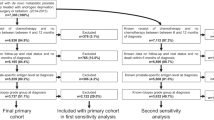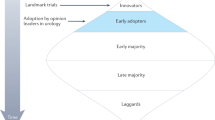Abstract
Understanding the role of chemotherapy for prostate cancer has advanced along two axes, better definition of endpoints, and biologic understanding of disease targets. Use of PSA as a surrogate endpoint makes possible the more rational design of phase III trials which will include survival and disease free intervals as an endpoint. Pain control has emerged as an important treatment endpoint through which more cost-effective care can be envisioned. Discovery of growth factor interactions with prostate cancer cells and the elucidation of apoptotic pathways have provided numerous new targets for biologic and chemotherapy of advanced disease.
This is a preview of subscription content, access via your institution
Access options
Subscribe to this journal
Receive 4 print issues and online access
$259.00 per year
only $64.75 per issue
Buy this article
- Purchase on Springer Link
- Instant access to full article PDF
Prices may be subject to local taxes which are calculated during checkout
Similar content being viewed by others
Author information
Authors and Affiliations
Rights and permissions
About this article
Cite this article
Glode, L., Petrylak, D. Refractory disease, new horizons and patient–physician relationships. Prostate Cancer Prostatic Dis 2 (Suppl 1), 19–20 (1999). https://doi.org/10.1038/sj.pcan.4500272
Published:
Issue Date:
DOI: https://doi.org/10.1038/sj.pcan.4500272



